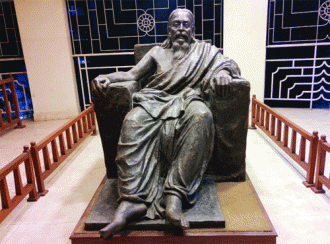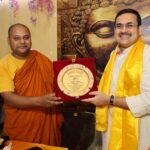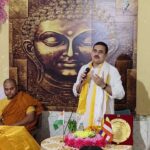FERVENT NATIONALIST, PRAGMATIST
- By : Anirban Ganguly
- Category : Articles

Sri Aurobindo’s concept of internationalism was to have nations before ‘inter’, but today, a number of organisations and individuals, with no known allegiance to the nation, continue to stymie India’s march, by either placing various hurdles or vocally advocating its dissolution
I note with satisfaction the discussion my last week’s column on Sri Aurobindo generated. A large number of my readers have requested me to continue with a ‘sequel’, if possible, I accede to that request through this second column on Sri Aurobindo and propose to perhaps continue with a few more for a while. I have mainly focussed on those thoughts of the Sage that people would not normally know or those which has been conveniently camouflaged from public discourse.
The unilateral narrative put into circulation by Marxists and dynasts in India has ensured that our epochal thinkers remain shrouded in the mist of ignorance or marginalised through, to use a term from British political philosopher Robert Scruton, a “culture of repudiation”, in which any personality of worth who has contributed positively to strengthening the foundations of the edifice of our national life, or any idea that has enriched our civilisational collective is faced with rejection or deconstruction. It is this ‘culture of repudiation’, assiduously practised in the case of thinkers who have expounded on civilisational India and have focussed on the high-watermarks of its achievements, which has ensured that personalities like Sri Aurobindo are never studied in earnest or discussed in detail. Thinkers, such as him, have been the worst victims of the academic apartheid which had been practised in India till the other day. Our lager objective ought to be to break that discriminatory cordon.
Let us begin this instalment then with a dedication to those for whom internationalism has become a fad or cover for working towards the deconstruction of the nation. When asked whether when he wrote that he looked upon India “not as an inert, dead mass of matter, but as the very Mother, the living Mother” it was the “truth” or whether “it was just the expression of a poetic or patriotic sentiment?” Sri Aurobindo replied, to his amanuensis Nirodbaran, “My dear Sir, I am not a materialist. If I had seen India as only a geographical area with a number of more or less interesting people in it, I would hardly have gone out of my way to do all that for the said area…” Sri Aurobindo was emphatic that “we had in India the cultural and spiritual idea of the nation.”
When told that internationalism must triumph while nationalism can be dispensed with, Sri Aurobindo is said to have observed in his characteristic manner, “But you must have nations before you can have ‘inter’ between them…internationalism is alright, we accept it on its own plane. But we must have nations first…I should be on good terms with my neighbour, but that does not mean that I should allow him to come into my house and occupy it.” Unfortunately, a woolly internationalism signified our approach to the world in the early decades after independence. Today, in the name of the same false internationalism, a large number of organisations and individuals, with no known allegiance to the nation, continue to try and stymie India’s march either by placing various hurdles or by vocally advocating its dissolution and vivisection.
To disciples in the then Muslim League-ruled Bengal who asked what line their political action ought to take, Sri Aurobindo’s directive was to stand by Syama Prasad Mookerjee and strengthen his efforts at opposing the oppression unleashed by Jinnah’s minions on Hindus of Bengal. The directive was especially given to Tejendranath Mukherjee, son of the legendary revolutionary nationalist Jatindranath Mukherjee Bagha Jatin who was deeply disturbed to see the plight of the Bengali Hindus under the Muslim League. Tejendranath was encouraged to re-launch the nationalist mouthpiece Sarathi and to organise a forum called the Sanatana Hindu Dharma Sabha in Bengal. To Surendra Mohan Ghosh, a revolutionary of the Jugantar group who took on the mantle of the Bengal Provincial Congress Committee and who had directly told the Mahatma that being a revolutionary he could not totally adhere to the creed of charkha and non-violence, Sri Aurobindo expressed concern for the Hindus of Bengal and Assam.
In a letter to Ghosh, in December 1946, on a particular provision of the Cabinet Mission plan, especially the grouping provision, that pertained to Assam, the Sage presciently wrote how if the Muslim League is allowed to have its way, it could “mean the end of the Assamese people and of Hinduism in Assam”. Sri Aurobindo pointed out the dangers of how “…Assam could be flooded with Mahomedan colonies from Bengal and be made safe for Pakistan; after that the obliteration of Hinduism in the Province could be carried out either by an immediate and violent or a gradual process once the separation of India into Pakistan and Hindustan had been effected.” The last six decades, especially the period when the Congress ruled Assam, has seen this uninterrupted flood continue to alter the socio-religious dynamics of the State and pose a grave challenge to the very fabric of Assamese culture and traditions. What the Muslim League aimed at the marginalisation of Hindus the Congress in Assam and the Left and the Trinamool Congress in West Bengal have worked to implement and push through in independent India.
To a disciple who asked him whether in his scheme of things he saw India free, the Sage exuded a greater worry when he said that India’s freedom was a settled affair and it was “a question of working out only”, but the larger question for him was what “is India going to do with her independence? Would it be besieged with “Bolshevism?” or plagued with goonda raj? While political Bolshevism posed the most ominous challenge to the fledgling Indian republic in its early years, intellectual Bolshevism dominated its academic institutions for decades imposing a uni-narrative and mercilessly suppressing any alternate voice. As for goonda raj, the politics of goondaism became the order of the day in many parts of India, while in West Bengal, for four decades, one saw the most potent mix of Bolshevism and goonda raj. Now, of course, Bolshevism has waned in that State while goonda raj continues to hold sway under the present dispensation.
Even in his retirement Sri Aurobindo kept himself remarkably abreast of political developments both domestic and international. His interventions between 1949 and 1950 on India and the world demonstrate a deep and minute understanding of world currents and of political currents in India. “For a recluse”, as his obituary in a leading English daily noted, Sri Aurobindo, “was remarkably interested in and informed on politics. And it is perhaps typical of his strongly individualistic mind that his views on mundane affairs more often than not bordered on the controversial…” In an India that gradually came to be dominated by a monochromatic discourse, personalities with ‘individualistic’ minds were best left cornered. In the three years that he lived after independence, Sri Aurobindo actively articulated his stands on a range of issues and challenges facing India, a reading of these give an insight into his fascinating nationalism and pragmatism in favour of India’s national interest…

















